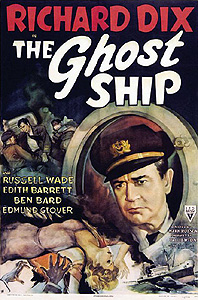The Ghost Ship, directed by Mark Robson in 1943, is considered to be one of the lesser pictures produced by Val Lewton at RKO in the mid-1940s. It’s certainly not in the same class as Cat People or The Seventh Victim but very few movies are. It’s still an interesting little movie.
The story concerns a young man, Tom Merriam, on his first posting at sea as third officer of a freighter called the Altair. The captain seems to want to take Merriam under his wing, but Merriam soon notices some rather worrying things about his captain. Like the captain’s obsession with authority. He talks about it constantly. Much of what he says on the subject, and on command and responsibility, is more or less true. It’s just that he seems to take it a little too far. A captain must appear to his crew to be infallible but when he starts to believe that he really is infallible, that even an unreasonable order becomes reasonable because as captain he has the right to give such an order, the situation can become dangerous.
Things start to go wrong on this voyage right from the start. A member of the crew dies soon after the ship leaves port. There is a potentially disastrous incident involving a cargo hook, an incident that casts doubt on the captain’s judgment.
There are obvious parallels to The Caine Mutiny. Both films deal with a junior officer who begins to suspect that the captain of the ship is dangerously incompetent. In both cases the captain’s behaviour is ambiguous - there are incidents that could be interpreted as errors of judgment but could just as easily be ascribed to chance or misfortune. Once a subordinate begins to suspect a superior of incompetence there is the danger that he will misinterpret the superior’s actions.
Of course there are differences. In The Ghost Ship the captain really does turn out to be dangerous - incompetent perhaps, but mad certainly.
There are further incidents as the voyage progresses and these incidents could be ascribed not merely to incompetence but possibly even malice.
Tom Merriam persuades himself that he must do something about the situation but his difficulty is that he has no real evidence - certainly nothing that would be likely to convince a court of enquiry.
Richard Dix as the captain gives us a fine portrait of a lonely, insecure, fearful personality clinging to his rigid notions of authority because those notions are all he has. The major weakness of the movie is Russell Wade as Merriam – he’s too bland and too earnest.
The film’s biggest weakness is the stilted dialogue that Donald Henderson Clarke’s screenplay offers the actors, and the problem is compounded by the fact that none of the actors can be said to have the acting chops to overcome the weakness of the script.
The story itself is a good one - it just needed someone to do a bit more work on the dialogue.
Like most of the Lewton pictures this is a psychological study rather than a monster movie – a psychological study not just of an authoritarian personality, but of the way other people allow such personalities to exercise their despotic powers. It’s a story of paranoia made more intriguing by the fact that there’s paranoia on the part of both the hero and his adversary.
The story could perhaps be interpreted as a commentary on the nature of totalitarianism - and a captain’s power over his crew is as absolute as that of a totalitarian political leader. The theme of unwillingness to confront authority and unwillingness to defy the pressure to conform is however more of a universal theme of individualism versus the herd instinct.
The ending is just a little rushed, but the movie includes some wonderful scenes – the scene with the swinging hook, and the one with the anchor chain, are highly original, visually arresting and very scary. Since it’s done once again by Nick Musuraca (who was director of photography on several of the most notable Val Lewton pictures) it is hardly necessary to add that the cinematography is superb and that it has a definite film noir atmosphere. The feel of the movie in fact combines film noir and gothic imagery.
The Warner Home Video DVD release (which pairs The Ghost Ship with The Leopard Man on a single disc) offers a very satisfactory transfer.
This might not be in the top rank of Lewton’s RKO productions but Lewton’s lesser films are still better than most people’s best films. The Ghost Ship is a moody low-key psychological suspense thriller with just a hint of horror. It’s an interesting enough story and the exceptionally original visual imagery are sufficient to make it as must-see. Highly recommended.





No comments:
Post a Comment